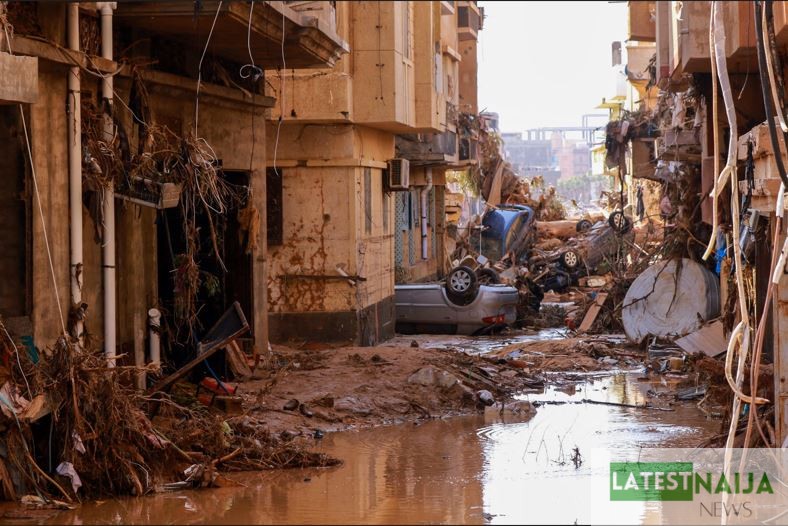In a significant development following the recent catastrophic flash flood disaster that wreaked havoc and claimed thousands of lives, Libya’s prosecutor general issued orders for the immediate arrest of eight officials.

This action is part of an extensive inquiry to determine accountability and responsibility for the tragedy that unfolded on September 10.
The flash flood disaster was triggered when torrential rains and a hurricane-strength storm struck the region surrounding Derna, a crucial port city in the eastern part of Libya. Two aging dams, unable to withstand the fury of the natural forces, ultimately succumbed to the deluge.
The officials who now face arrest are under suspicion of “bad management” and gross negligence. The prosecutor general’s office, in a statement, specified that these individuals currently or previously held positions in offices responsible for water resources and dam management.
As of the latest reports, the official death toll has surpassed a grim 3,800, while international aid groups have raised concerns that over 10,000 individuals might still be missing.
The investigation into the disaster began over a week ago, when Libya’s prosecutor general, Al-Seddik al-Sur, revealed that the two dams upstream from Derna had exhibited structural issues dating back to 1998. However, efforts to address these concerns, initiated by a Turkish company in 2010, were abruptly halted after just a few months due to the eruption of Libya’s 2011 revolution.
Unfortunately, the crucial repair work never resumed a fact highlighted by the prosecutor on September 16, as he pledged to take firm action against those responsible.
The 2011 NATO-backed revolt resulted in the fall of the longstanding dictator, Moamer Kadhafi, ushering in a turbulent period marked by more than a decade of intermittent conflicts. Presently, Libya remains divided between an internationally recognized administration based in Tripoli, to which Prosecutor Al-Sur is aligned, and another governing body in the flood-ravaged east.
The eastern forces had previously launched a failed assault on the capital, which ultimately culminated in a ceasefire in 2020. Since then, Libya has experienced a relatively stable period, allowing the war-torn nation to embark on the challenging journey of reconstruction.
The flood disaster commenced with the collapse of the Abu Mansur dam, located approximately 13 kilometers (eight miles) from Derna, containing a reservoir with a capacity of 22.5 million cubic meters (nearly 800 million cubic feet) of water. Subsequently, the destructive force of the floodwaters led to the breach of the Al Bilad dam, with a capacity of 1.5 million cubic meters, situated a mere kilometer from the coastal city. The surge of water and debris carved through the ordinarily dry riverbed, or wadi, that traverses the city center.
Both dams had been constructed by a Yugoslav company in the 1970s, not for water retention but as flood protection measures for Derna, as emphasized by Prosecutor Al-Sur in earlier statements.
Since the 2011 revolution, an annual budget allocation had been earmarked for the rehabilitation of the two dams, but none of the successive governments took the initiative to initiate the necessary repairs, according to an official source.
In a sobering 2021 report from the Libyan audit bureau, officials chastised the repeated delays in resuming the crucial repair work at the two dams. In November 2022, engineer and academic Abdel Wanis Ashour sounded a dire warning in a study, predicting a looming “catastrophe” for Derna if the authorities continued to neglect maintenance on the dams.
The investigation into this devastating disaster is now underway, with the hope of uncovering the truth behind the series of events leading to this tragic loss of life and property.

Submit press release, news tips to us: tips@odunews.com | Follow us @ODUNewsNG
